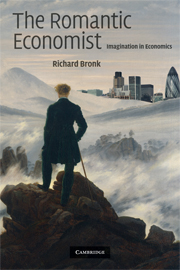Book contents
- Frontmatter
- Dedication
- Epigraph
- Contents
- Preface
- Acknowledgements
- 1 Preface to The Romantic Economist
- PART I THE PRELUDE: THE ROMANTIC ECONOMIST AND THE HISTORY OF IDEAS
- PART II Fragments of Unity: Romantic Economics in Practice
- 5 Using organic metaphors in economics
- 6 Economics and the nation state
- 7 Incommensurable values
- 8 Imagination and creativity in markets
- 9 Homo romanticus and other homines
- 10 Imagination and perspective in economics
- 11 The Romantic Economist: conclusion
- Notes
- Bibliography
- Index
8 - Imagination and creativity in markets
Published online by Cambridge University Press: 05 March 2015
- Frontmatter
- Dedication
- Epigraph
- Contents
- Preface
- Acknowledgements
- 1 Preface to The Romantic Economist
- PART I THE PRELUDE: THE ROMANTIC ECONOMIST AND THE HISTORY OF IDEAS
- PART II Fragments of Unity: Romantic Economics in Practice
- 5 Using organic metaphors in economics
- 6 Economics and the nation state
- 7 Incommensurable values
- 8 Imagination and creativity in markets
- 9 Homo romanticus and other homines
- 10 Imagination and perspective in economics
- 11 The Romantic Economist: conclusion
- Notes
- Bibliography
- Index
Summary
At the dawn of the Romantic era, Herder wrote: ‘Of all the powers of the human mind the imagination has been the least explored, probably because it is the most difficult to explore.’ The Romantics who followed did their best to remedy this, with brave if unsystematic attempts to elucidate the nature of imagination — the faculty they saw as central to our very humanity. Coleridge, for example, asserted that the imagination is ‘the distinguishing characteristic of man as a progressive being’, and ‘the indispensable means and instrument of continued amelioration’. He described the magination as a divine gift, which ‘stimulates to the attainment of real excellence by the contemplation of splendid Possibilities … and fixing our eye on the glittering Summits that rise one above the other in Alpine endlessness still urges us up the ascent of Being’. Some 150 years later, Bronowski was to speak in somewhat similar terms in his book, The Ascent of Man. For him, ‘cultural evolution is essentially a constant growing and widening of the human imagination’; art and science both ‘derive from the same human faculty: the ability to visualise the future, to foresee what may happen and plan to anticipate it’. Imagination is, of course, more than this power to visualize and anticipate a different (often idealised) future and be motivated by it.
- Type
- Chapter
- Information
- The Romantic EconomistImagination in Economics, pp. 196 - 224Publisher: Cambridge University PressPrint publication year: 2009



